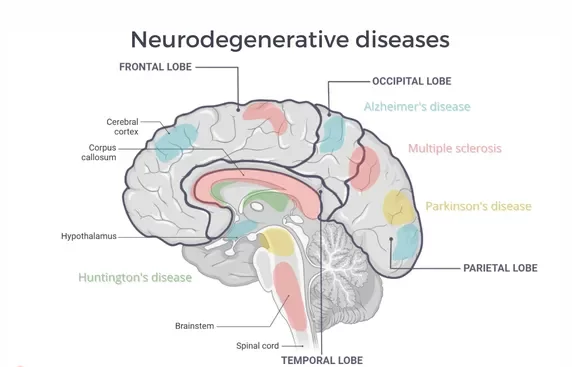Neurodegenerative Diseases: Understanding the Progression

Neurodegenerative diseases are a group of disorders characterized by the progressive degeneration and loss of function in the nervous system. These conditions affect millions of people worldwide, leading to significant disability and a reduced quality of life. In this blog post, we will explore the nature of neurodegenerative diseases, common types, their impact on individuals and society, and the latest advancements in research and treatment options.
Understanding Neurodegenerative Diseases
Neurodegenerative diseases involve the gradual and irreversible deterioration of nerve cells (neurons) in specific regions of the brain or spinal cord. This progressive degeneration results in a wide range of symptoms, including impaired movement, cognitive decline, memory loss, and changes in behavior or mood. While the exact causes of most neurodegenerative diseases are still unknown, researchers believe that a combination of genetic, environmental, and lifestyle factors contribute to their development.
Common Types of Neurodegenerative Diseases
- Alzheimer’s Disease: Alzheimer’s is the most prevalent neurodegenerative disease, characterized by memory loss, cognitive decline, and behavioral changes. It is associated with the accumulation of abnormal protein fragments in the brain, leading to the formation of plaques and tangles.
- Parkinson’s Disease: Parkinson’s affects movement and coordination, causing tremors, stiffness, and balance problems. It is caused by the loss of dopamine-producing cells in the brain, leading to a shortage of dopamine, a neurotransmitter involved in movement control.
- Huntington’s Disease: Huntington’s is a genetic disorder that causes the progressive breakdown of nerve cells in the brain. It leads to uncontrolled movements, cognitive decline, and emotional disturbances.
- Amyotrophic Lateral Sclerosis (ALS): ALS is a motor neuron disease that affects nerve cells responsible for voluntary muscle control. It leads to muscle weakness, paralysis, and eventually, respiratory failure.
Impact on Individuals and Society:
Neurodegenerative diseases have a profound impact on individuals, their families, and society as a whole. These conditions often result in a loss of independence, requiring ongoing care and support. The emotional and financial burden can be substantial, placing significant strain on caregivers and healthcare systems. Additionally, the societal impact includes reduced productivity, increased healthcare costs, and the need for extensive research and resources to address these complex diseases.

Advancements in Treatment
Although there is currently no cure for most neurodegenerative diseases, ongoing research offers hope for improved treatments and potential disease-modifying therapies. Scientists are exploring various avenues, including:
- Targeted Drug Therapies: Researchers are developing drugs to target specific proteins or mechanisms involved in the disease process, with the aim of slowing down or halting disease progression.
- Gene Therapy: Genetic approaches, such as gene editing and gene silencing techniques, hold promise for treating certain inherited forms of neurodegenerative diseases.
- Stem Cell Therapy: Stem cell research is exploring the potential of using stem cells to replace damaged or lost neurons, promoting regeneration and restoring function.
- Lifestyle Interventions: Evidence suggests that adopting a healthy lifestyle, including regular exercise, a balanced diet, cognitive stimulation, and social engagement, may help reduce the risk of neurodegenerative diseases and slow their progression.
Neurodegenerative diseases pose significant challenges for individuals, families, and society at large. Understanding the nature of these conditions, their impact, and the advancements in research is crucial. While there is still much to learn, ongoing research provides hope for future treatments and interventions that may improve the lives of those affected by these devastating diseases. By supporting research efforts, raising awareness, and promoting a healthy lifestyle, we can contribute to the fight against neurodegenerative diseases.
